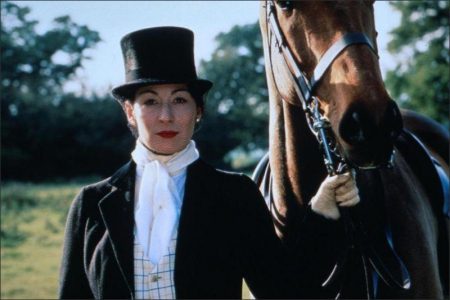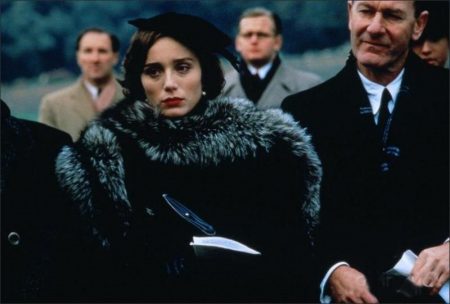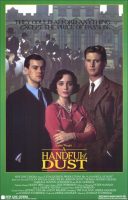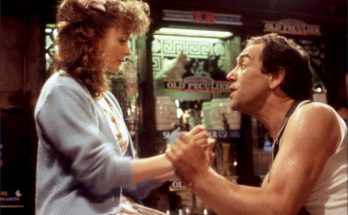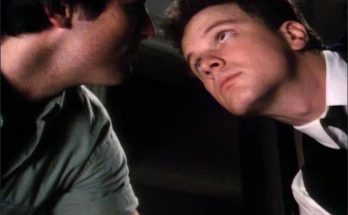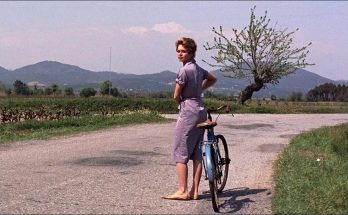Taglines: They could afford anything… Except the price of passion.
A Handful of Dust movie synopsis. We see the detritus of an abandoned camp in South America and a main character’s hallucination. Then, the story beings. Tony and Brenda Last, lord and lady, live on his enormous estate with their young son. Tony’s not much for parties, and Brenda joins London society, on the arm of a penniless man, John Beaver, a hanger-on at Tony’s club.
John is encouraged by his entrepreneurial mother, who sees a quid in Tony and Brenda. Brenda and John become lovers, Brenda spends more and more time in London, and Tony’s without a clue. Then, bringing things to a head are tragedy, law suits, greed, and what should be a few-months’ expedition to Brazil. We are each of us merely a handful of dust.
A Handful of Dust is a 1988 film directed by Charles Sturridge, based on the 1934 novel of the same name by Evelyn Waugh. It stars James Wilby, Kristin Scott Thomas, Judi Dench, Richard Beale, Jackson Kyle, Norman Lumsden, Jeanne Watts, Kate Percival and Anjelica Huston. It was nominated at the 61st Academy Awards for Best Costume (Jane Robinson), losing to Dangerous Liaisons. Judi Dench won the BAFTA Award for Best Supporting Actress.
Film Review for A Handful of Dust
he characters of Evelyn Waugh are a lesson in the other end of anthropology. Here are the natives of a highly articulated culture that has no myths, only rituals. Like a magician’s, all their tricks are in their top hats. Dying of manners, they are determined to go on snubbing reality, as if it were a crasher at the party. The most thoroughly weaned generation in the world, they are discovering that a little money is a dangerous thing.
To read Mr. Waugh’s novels reminds me of going to a high school prom in a rented tuxedo. One took a girl in an organdy dress and provided a gardenia that she pinned above and to the left of her bosom. The music was invariably insipid and the dances rigidly patterned. At the end of the evening, the orchestra played “Good Night, Ladies.”
According to Mr. Waugh, the English upper classes are leading a rented life and the orchestra plays nothing but “Good Night.” Yet there is something touching about these tailors’ and dressmakers’ dummies: They are like the elaborate dolls you can’t buy anymore except in antiques shops at astronomical prices. They represent custom’s last stand.
There is no comfortable catharsis in Mr. Waugh’s comedy of manners. He makes you feel that the alternative to this archaic structure is not a new order, but a chaos as old as humanity. The cardinal sin in the upper classes is to “go on about things” with unconscionable persistence: One suspects that, in Mr. Waugh’s vision, the “masses” will go on forever about everything.
Little, Brown, Mr. Waugh’s American publisher, has done itself proud by reissuing, handsome clothbound volumes, no fewer than seven of Mr. Waugh’s early and best novels, some of which had long been out of print. Since I cannot review them all here, I will take “A Handful of Dust,” which is my favorite.
Tony and Brenda Last are such a splendid couple that they are almost redundant. They have been married for seven happy years and have produced what is one of the rarest things in fiction: An appealing little boy. Tony, who has inherited a large country estate, is a traditionalist, a man who believes that with proper care, you can preserve the character of houses and of people.
Brenda is the first to become bored by the symmetry of their relationship. She is so clever and so well bred that she longs for mediocrity, which she confuses with freedom. She finds it in the person of John Beaver, a man whose only usefulness is in making up an even number at dinner parties. Brenda is not exactly attracted to Beaver: He simply arouses her curiosity by being similar but inferior to everyone she has ever known. A playful woman, she enjoys the games of trying to discover whether he actually has a personality.
On his side, Beaver entertains doubts about Brenda, too. What can she possibly expect from him? He cannot afford her, either financially, emotionally or socially. He realizes that his incongruity is his only charm, that he is a plastic flower upon which a beautiful butterfly has lit.
A few firm words from Tony would keep Brenda from going to London, where she sees Beaver, but Tony is too well bred to “go on” about Brenda’s frequent absences. On her part, Brenda does everything a fond wife can do to console Tony. She brings out Jenny Abdul Akbar for the weekend in the hope that she will provide a distraction. Jenny, who has had a difficult life as the wife of a Moroccan moulay, may be the first woman in serious fiction who genuinely believes that her “scars” are irresistible. She is a gorgeous forerunner of a type that was to animate American fiction for the next few decades.
While he is essentially a satirist, Mr. Waugh can write a tragic scene as well as anyone. When Tony’s son is killed in a riding accident, Brenda is in London and Tony has no one to talk to but Mrs. Rattery, who has just arrived in her own airplane. The mistress of one of Tony’s friends, she kindly offers to stay with him while the friend carries the news to Brenda.
Mrs. Rattery is a card player and she tries to help Tony give pattern to his grief with a game of bezique or piquet. He knows only Animal Snap, which he used to play with his son. A resolute condoler, Mrs. Rattery insists that they play, and before long the servants are surprised to hear “bow wow” and “coop-coop-coop” coming from the library.
Brenda sues for divorce, Tony goes off to South America, with a man he met at his club, in search of a lost city. He is still, apparently, devoted to the past. What he finds, however, is an elderly black patriarch, Mr. Todd, whose passion for the past exceeds even Tony’s. Mr. Todd is addicted to reading Dickens, only he cannot read, and he keeps Tony in his jungle fastness for this purpose. Together, they go through Dickens’ entire oeuvre, with the exception of two volumes the ants have got–and when they have finished they begin again. As T.S. Eliot remarked, the ideal audience would be an illiterate one.
I wonder, as we leave Tony there, whether he will not eventually be happier with Mr. Todd and Dickens than if he were to make his way back to England. With American life going on as it has been, I sometimes feel like holing up with the complete works of Evelyn Waugh.
A Handful of Dust (1988)
Directed by: Charles Sturridge
Starring: James Wilby, Kristin Scott Thomas, Judi Dench, Richard Beale, Jackson Kyle, Norman Lumsden, Jeanne Watts, Kate Percival, Anjelica Huston
Screenplay by: Derek Granger, Charles Sturridge
Production Design by: Eileen Diss, Chris Townsend
Cinematography by: Peter Hannan
Film Editing by: Peter Coulson
Costume Design by: Jane Robinson
Music by: George Fenton
Distributed by: Premier Releasing
Release Date: June 24, 1988
Views: 175
